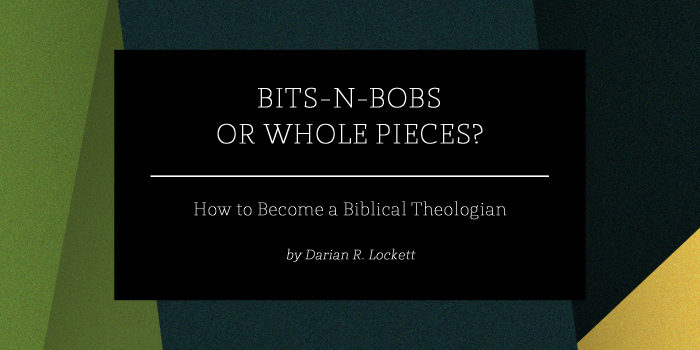
Bits-n-Bobs or Whole Pieces? How to Become a Biblical Theologian (Darian R. Lockett)
The new issue of Credo Magazine is here and Darian Lockett has contributed a feature article titled, “Bits-n-Bobs or Whole Pieces? How to Become a Biblical Theologian.” Lockett is Associate Professor of Biblical and Theological Studies at Biola University. He is the co-author (with Edward Klink III) of Understanding Biblical Theology: A Comparison of Theory and Practice (Zondervan).
 Here is the introduction to Lockett’s article:
Here is the introduction to Lockett’s article:
When I lived in Scotland I passed by an odd storefront most days as I walked to my university office. The marque on the storefront read “Bits and Bobs” and the store was full of the most random collection of goods for sale. One day I saw an electric drill, nappies (diapers), and various food items all haphazardly arranged in the front window. Unwittingly we often read the Bible in a similarly jumbled way. Growing up memorizing bits of Scripture like John 3:16, “For God so loved the world…”; Philippians 4:13, “I can do all things through him who strengthens me”; or Proverbs 3:5, “trust in the Lord with all your heart…”, we carry around with us a haphazard collection of Bible verses with the intention or hope that Scripture will shape our thoughts and actions. Yet when we absorb the Bible this way there is a great risk of taking passages that belong to the unbroken, overarching narrative shape of Scripture and unintentionally reconfiguring them into the narrative of our lives. Rather than being confronted by the canonical shape of God’s story of redemption, we bend the text into the shape of our own lives and make the Bible to be a story more about us—our fulfillment, our sanctification, our “best life now.” Like taking sticky notes and pasting them to ourselves, reading the Bible this way is like taking bits and bobs of Scripture rearranging them after the shape or image of the reader, rather than the image of Christ.
So how do we read Scripture without distorting its overarching shape? Well, here is where reading Scripture with an eye toward biblical theology will help. Before I suggest a few ways of reading Scripture as the unfolding story of God’s redemptive purposes and then offering some observations regarding what kind of people we ought to be in this reading endeavor, let me make two opening comments.
Read the rest of Lockett’s article today:
What’s the Big Idea Story?
Why Biblical Theology Should Matter to Every Bible-Believing Christian
When the sixteenth-century Reformation erupted, one of the alarming dangers that became blatantly obvious to reformers like Martin Luther was the pervasiveness of biblical illiteracy among the laity. It may be tempting to think that this problem has been solved almost five hundred years later. However, in our own day biblical illiteracy in the pew continues to present a challenge. Many Christians in our post-Christian context simply are not acquainted with the storyline of the Bible and God’s actions in redemptive history from Adam to the second Adam.
With this concern in mind, the current issue of Credo Magazine strives to take a step forward, in the right direction, by emphasizing the importance of “biblical theology.” Therefore, we have brought together some of the best and brightest minds to explain what biblical theology is, why it is so important, and how each and every Christian can become a biblical theologian. Our hope in doing so is that every Christian will return to the text of Scripture with an unquenchable appetite to not only read the Bible, but comprehend God’s unfolding plan of salvation.
Contributors include: Justin Taylor, Darian Lockett, Edwards Klink III, David Murray, Stephen Dempster, James Hamilton, T. Desmond Alexander, Stephen Wellum, Peter Gentry, G. K. Beale, Graham Cole, and many others.

